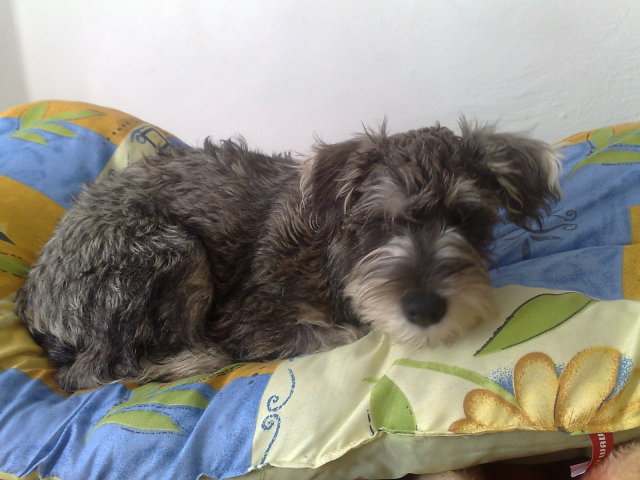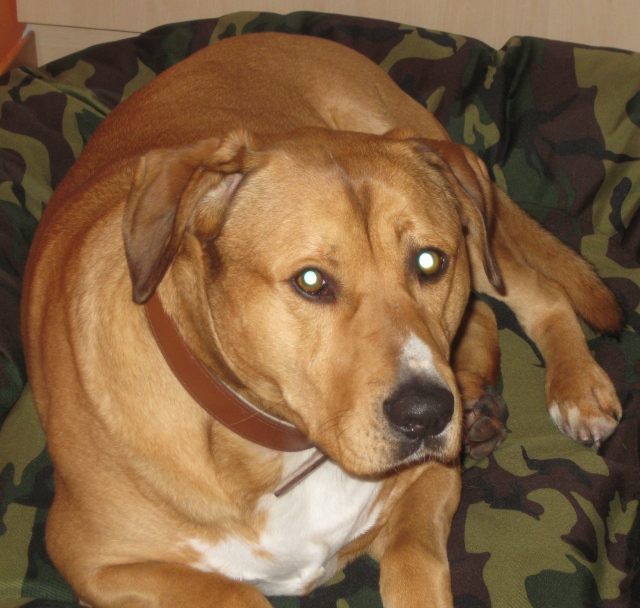QuestionMy Dalmatian is 12. If he needs to relive himself he does not have tine to get outside and often messes indoors especially at night. Is this something Dalmatians are prone to or please tell me what could possibly be going wrong.Thank you.
AnswerHi Jill,
Thank you for writing to me about your 12 year old Dalmatian.
The first thing that is necessary is to have a full exam done by your vet including a complete blood workup. Have him check for parasites, worms, including Giardia and Cryptosporidium.
There are many possible causes of bowel incontinence. Usually it requires an extensive medical work-up to diagnose the cause (or causes). Your vet will need to test for such things as neurological or musculoskeletal problems, disc disease, spinal tumors, other forms of cancer, etc., in order to advise the proper treatment and give a prognosis.
If bowel incontinence is only occasional, and particularly if it's the kind that "slips out" accidentally when your dog is asleep, you may simply need to manage the problem with the right equipment. This is assuming that your vet has ruled out a condition that requires other treatment.
For bowel incontinence, in addition to a protective "set up," you may want to try changing feeding times so that your dog has finished digesting the last meal of the day before going out for a last walk.
For clean-up, use a product such as vinegar and "Nature's Miracle" to eliminate stains and odors from any surfaces that were not protected by pads or washable bedding. For tough stains, a highly recommended product is Quick'N Brite, 1.800.223.9187.
Foam rubber mattresses with plastic covers and a washable, artificial sheepskin topper are useful. You can wash the sheepskin toppers daily.
Inflammatory Bowel Disease
Inflammatory bowel disease occurs in middle-aged and older dogs. It is a reaction that the stomach or intestines have to chronic irritation.
To treat inflammatory bowel disease, ideally your vet should diagnose the underlying disease that is causing the chronic irritation. If diagnosis is not feasible, however, a change in diet can be prescribed. If that is not successful, corticosteroids and other drugs can be tried.
Alternative therapy info:
Inflammatory bowel disease; irritable bowel syndrome; eosinophilic gastritis/enteritis/colitis. These are all variations on the same theme: Inappropriate intestinal inflammation. Causes include, but are not limited to: Food allergies; stressors such as physical/emotional trauma; sensitivity to xenobiotics in commercial food; the vaccinosis issue (inapropriate immune stimulation catalyzed by excessive antigenic stimulation from vaccines); in traditional Chinese medicine you have liver qi stagnation (stressors, chemicals, emotions, allergies) developing into heat (stasis of the metabolically active liver allows for internal developement of heat) overacting on some site within the GI tract. What to do?
1) Dietary management with a hypoallergenic (for the individual sensitivity of that individual patient) fresh food diet. Use wetly-cooked white rice, sweet potato, yam, squash or pumpkin, with a bland cooked source of protein. Sometime the water the rice has been cooked in can be helpful.
Studies in humans indicate that animal protein and animal fats contribute to this Inflammatory Bowel syndrome. Those studies also point out that the ration of Omega3 to Omega 6 oils needs to be about 1:4 for management and prevention of IBS. Be careful adding rich foods to the elimination diet, this includes the addition of flax oil (1 tsp/25 pounds/day)--do it gradually.
Concentrated fish oil extracts containing standardized extracts of eicosapentaenoic acid and docosapentaenoic acid which help to inhibit the pro-inflammatory arachidonic acid eicosanoid cascade. Start this supplement gradually as well.
Give 180mg EPA for each 25 pounds of body weight (work up slowly) Hypoallergenic commercial diets are bettter than no dietary change at all. Add wetly-cooked white rice to the meal to lower the percentage protein and added some GI benefit. Include Slippery Elm Bark and Ginger.
The World Health Organization has sanctioned the use of rice water for the treatment of diarrhea in developing countries. Rice water has been shown to contain some special polypeptides that help to tighten up the intestinal cell tight junctions--thereby improving water resorption from the lower bowel.
Anti-oxidants and anti-iflammatory agents such as Ester- C (250-3000mg/day), Vitamin A (5000-10000 IU/day), zinc(5-20 mg/day), Vitamin E (400-1200 IU/day) and selenium (25-150 mg/day) are supportinve of this healing process.
2) Intestinal support: Add beneficial bacteria and probiotic enhancers such as fructo-oligosaccharides, inulin and/or jerusalem artichoke flour; exogenous digestive enzymes to help support digestion and take some of the burden off a potentially inflammed pancreas; high doses of glutamine 500-3000 mg/day will help to support intestinal cell repair. Glutamine has been shown to have many functions, including the repair of intestinal villous atrophy.
The use of soothing demulcent herbs such as aloe vera gel, marshmallow root, or slippery elm (caution, its an endangered species), or ground psyllium seed can help with the mucosal inflammation.
A Chinese herb: pseudoginseng (500- 2000mg/day) can be very helpful with hemorrhagic inflammmatory bowel cases, and clinically cats claw (uncaria tormentosa) seems to work well in relieving inflammation.
The Chinese herbal combination, Ginseng and Atractylodes, Coptis and Evodia, and the ITM formula Ginseng 18 have all been helpful in supporting the repair process.
Good luck with addressing this situation.
Best Regards,
Shelley Davis

 Anxiety separation????
Question
donovan
HI then, I got my schnauzer when it w
Anxiety separation????
Question
donovan
HI then, I got my schnauzer when it w
 Dog Breed.
Question
Recent photo this week
Hello,
I saw that you
Dog Breed.
Question
Recent photo this week
Hello,
I saw that you
 aggressive behavior between my 3 dogs
Question
My loves watching tv
I have always had boxers,
aggressive behavior between my 3 dogs
Question
My loves watching tv
I have always had boxers,
 Cant afford medical care for my yorkie
Question
Mr. Bojangles BoBo
Hi, I adopted
Cant afford medical care for my yorkie
Question
Mr. Bojangles BoBo
Hi, I adopted
 Strange dog behaviour ; organic brain syndrome in canine;
Question
Alfie
All of a sudden my 4 year old dog does n
Strange dog behaviour ; organic brain syndrome in canine;
Question
Alfie
All of a sudden my 4 year old dog does n